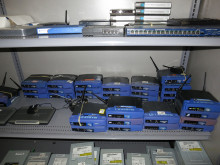Airport Scanners Have Account Backdoors, Default Passwords
How many people listened to the Black Hat talk about the backdoor accounts present in scanners used by many airports in the United States and thought, "How am I going to fly back home after this?" I know I did.
Many of the machines deployed at airport security checkpoints have embedded accounts with default passwords that can be abused, Billy Rios, director of threat intelligence at Qualys, told attendees at the Black Hat conference on Wednesday. In this case, the concern is that attackers may be able to use the accounts as a backdoor to get access to the system.













































































